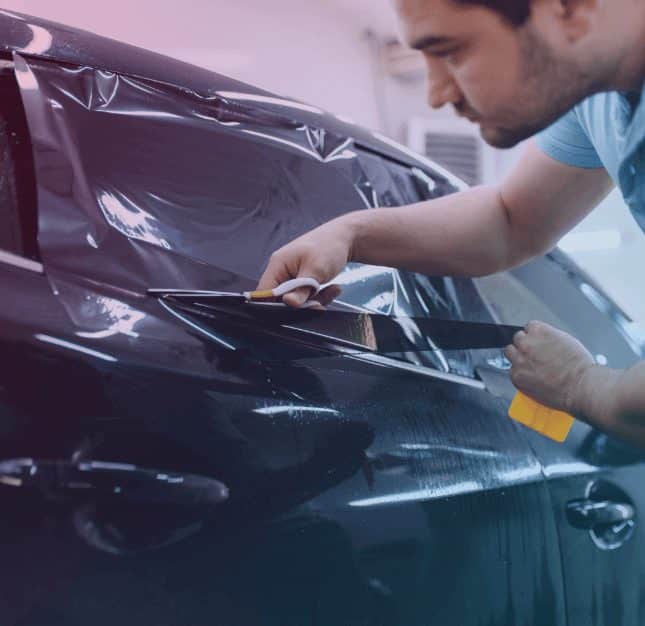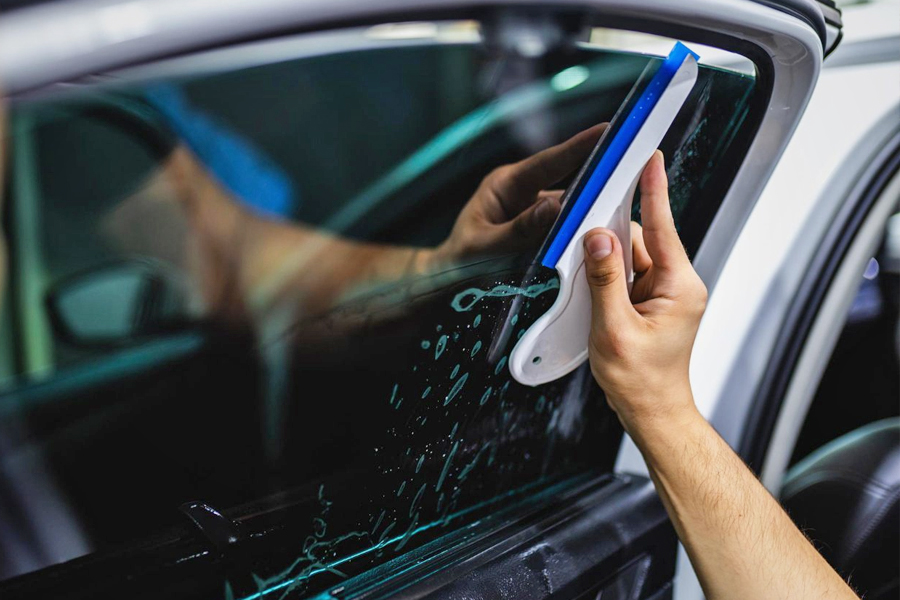A Comprehensive Overview to Solutions Provided With Home Window Color Solutions
Home window tinting has come to be an essential service for both business and property settings. It uses different movies made to satisfy specific requirements, such as warmth reduction and personal privacy enhancement. Comprehending the range of alternatives offered is vital for making notified decisions. This overview will check out the various sorts of window tinting movies, their advantages, and the installment process. It will also address lawful factors to consider that may influence your selections. What elements should one take into consideration before proceeding?
Kinds of Window Tinting Films
Home window tinting movies been available in different kinds, each created to meet specific demands and preferences. The most common types consist of colored, metalized, ceramic, and hybrid films. Dyed films offer a standard degree of personal privacy and heat reduction, using a color layer to absorb warmth. Metalized movies integrate little metallic particles, using boosted warmth denial and glow decrease while additionally adding longevity. Ceramic movies stand out for their premium performance, as they block heat without hindering signal transmission, making them perfect for digital gadgets. Hybrid movies combine elements of both colored and metalized films, providing an equilibrium between visual charm and practical benefits. Each film type varies relating to light transmission, UV defense, and warranty alternatives, permitting customers to pick a solution that straightens with their details needs and design preferences. Recognizing these choices is important for making an informed choice when considering home window tinting options.
Benefits of Residential Home Window Tinting
Residential window tinting deals a variety of advantages that boost both comfort and energy effectiveness in homes. One of the primary advantages is the decrease of warm gain, which brings about decrease power costs by lessening the reliance on cooling systems. In addition, window tinting assists to obstruct damaging UV rays, protecting both occupants and furnishings from sunlight damages and fading.Moreover, it boosts privacy without endangering natural light, enabling house owners to enjoy their sights while maintaining prying eyes at bay. The application of window film additionally boosts safety by holding destroyed glass in position throughout tornados or mishaps, consequently decreasing injury risks.Furthermore, property window tinting can contribute to a more visually pleasing exterior, as numerous film choices are offered to match different architectural styles. Generally, these benefits make window tinting a useful and important investment for homeowners looking for improved livability and energy performance.
Advantages of Industrial Home Window Tinting
While several services seek ways to boost their workplace, industrial home window tinting provides a multitude of advantages that can considerably enhance both worker convenience and functional efficiency. One primary advantage is the reduction of glow, which can substantially enhance performance by enabling workers to work without disturbances from rough sunshine. Additionally, home window tinting can help control indoor temperatures, leading to reduced dependence on air conditioning and lower power costs.Furthermore, tinted windows use UV protection, protecting staff members and furnishings from dangerous rays that can cause skin damage and discolor materials. This protection not just adds to a much healthier job setting yet additionally lengthens the life of workplace insides. Inevitably, business home window tinting can enhance privacy, enabling services to keep an expert look while minimizing outdoors distractions. In general, these benefits make commercial home window tinting an important investment for businesses intending to enhance their work area.
The Window Color Setup Refine
A successful home window color setup procedure includes numerous essential steps to ensure excellent outcomes. The area and home windows have to be completely cleansed to remove dust, oil, and any kind of other contaminants that could influence attachment. Next off, the tint film is thoroughly gauged and cut to fit the specific measurements of each window.Following this, the installer uses a service to the glass surface area to permit for repositioning of the movie prior to it adheres. The movie is then positioned onto the window, ensuring it is without bubbles and wrinkles. Once located appropriately, a squeegee is used to eliminate excess water and air.Finally, the sides of the film are cut for a neat surface, and the installment is evaluated for top quality. Correct attention to these actions assures the durability and effectiveness of the home window tint, boosting both appearances and functionality.
Maintenance and Take Care Of Your Home Window Tint
Just how can one ensure the durability and appearance of window color? Appropriate upkeep and treatment are crucial. It is recommended to wait at least 30 days after setup prior to cleaning up the color to permit for correct bond. As soon as this period mores than, utilizing a soft fabric or microfiber towel can avoid scrapes while cleaning. Mild, ammonia-free cleansers should be used to stay clear of harming the film.Regular examinations of the edges and surface can aid recognize any bubbling or peeling early, enabling for timely repair work. Stay clear of utilizing unpleasant materials or rough chemicals that could weaken the color. Furthermore, vehicle parking in shaded areas or utilizing sunshades can minimize UV direct exposure, further securing the tint's stability.
Legal Factors To Consider for Window Tinting
Legal factors to consider for home window tinting differ significantly across different states. Each state has certain guidelines relating to visible light transmission limitations, which determine how much light can travel through colored windows. In addition, some states provide clinical exemptions, allowing individuals with particular conditions to make use of darker colors than generally allowed.
Tinting Laws by State
While home window tinting can improve a vehicle's appearances and give additional personal privacy, it is necessary for lorry owners to recognize the differing regulations that control tinting throughout various states. Each state has its very own certain laws concerning the allowable degrees of color darkness, representation, and the sorts of windows that can be tinted. As an example, some states allow darker tints on rear windows but impose stricter limitations on front side home windows. Additionally, specific states may require specific labels or certificates to validate conformity. Falling short to comply with these laws can cause fines or the need to get rid of the color (Davinci of Michigan Window Tinting). As a visit their website result, automobile proprietors should investigate their state's legislations before spending in home window tinting solutions
Visible Light Transmission Limits
Comprehending the noticeable light transmission (VLT) restrictions is vital for any individual taking into consideration window tinting. VLT refers to the portion of noticeable light that can pass with the tinted glass. Various states have varying laws pertaining to appropriate VLT degrees, especially for different home windows check this in cars. Front windscreens commonly have more stringent limitations contrasted to side and rear home windows. Breaking these regulations can lead to fines and the demand to remove non-compliant tinting. Therefore, it is very important for people to research their state's certain VLT laws prior to proceeding with home window tint setup. Conformity assurances not just legal adherence however additionally safety and exposure while driving, promoting a much safer setting for all road individuals.
Clinical Exemptions for Tinting

Picking the Right Window Tinting Solution
Picking the right window tinting solution involves a mindful evaluation of individual tinting requirements. It is important to assess numerous service alternatives, ensuring they straighten with the preferred outcomes. Furthermore, understanding the lawful policies controling window tinting can aid prevent possible problems down the line.
Assessing Tinting Demands

Evaluating Solution Options

Recognizing Lawful Laws
Prior to selecting a window tinting service, individuals must recognize the lawful laws controling tinting in their area, as these laws can vary considerably in between states and towns. Each jurisdiction may impose particular restrictions on the allowable color darkness, reflective buildings, and which windows can be tinted. Some states might permit darker tints on rear home windows while restricting them on front windows. Furthermore, regulations usually outline the sorts of products that can be used and may require specific labeling or accreditation. Failure to comply with these regulations can lead to penalties or the demand to eliminate the color. Possible consumers should validate the legality of their wanted color and seek advice from experts acquainted with regional laws to guarantee conformity.
Often Asked Questions
For How Long Does Window Tinting Usually Last?
The durability of home window tinting generally varies from 5 to 10 years, depending upon factors such as the quality of the movie, installment process, and environmental problems. Normal upkeep can additionally affect its life expectancy considerably.
Can Window Tinting Be Eliminated Conveniently?
The simplicity of home window color removal depends upon the installment approach and sticky utilized. Normally, professional solutions assure much safer, cleaner removal, while DIY attempts may cause damage to the glass or sticky residue.
Will Home Window Tinting Impact My Home's Resale Worth?
Window tinting can affect a home's resale value positively or negatively. Potential customers may value power financial savings and personal privacy, while others may see it as a personal preference, influencing overall charm and desirability of the building.
Are There Eco-Friendly Window Tinting Options Available?
The questions concerning eco-friendly home window tinting options reveals that a number of manufacturers currently use items making use of sustainable materials. These alternatives can lower power consumption and boost convenience while lining up with ecologically conscious practices in home improvement.
Can Window Tinting Aid With Power Effectiveness?
Home window tinting can greatly boost energy performance by reducing heat gain and loss. This aids maintain comfortable indoor temperature levels, potentially lowering home heating and cooling prices, while likewise contributing to an extra lasting environment with lowered power intake. The application of home window film also boosts safety and security by holding destroyed glass in place throughout mishaps or storms, thereby reducing injury risks.Furthermore, residential home window tinting can contribute to a more aesthetically pleasing outside, as numerous movie options are offered to match different building styles. Furthermore, window tinting can assist manage interior temperature levels, leading to lowered reliance on air conditioning and reduced energy costs.Furthermore, colored home windows supply UV defense, shielding workers and furnishings from hazardous rays that can cause skin damage and fade materials. Some states allow darker tints on rear home windows but impose stricter limits on front side windows. Prior to choosing a home window tinting service, individuals must recognize the lawful laws regulating tinting in their area, as these laws can differ substantially between states and communities. Some states might permit darker tints on rear home windows while forbiding them on front windows.